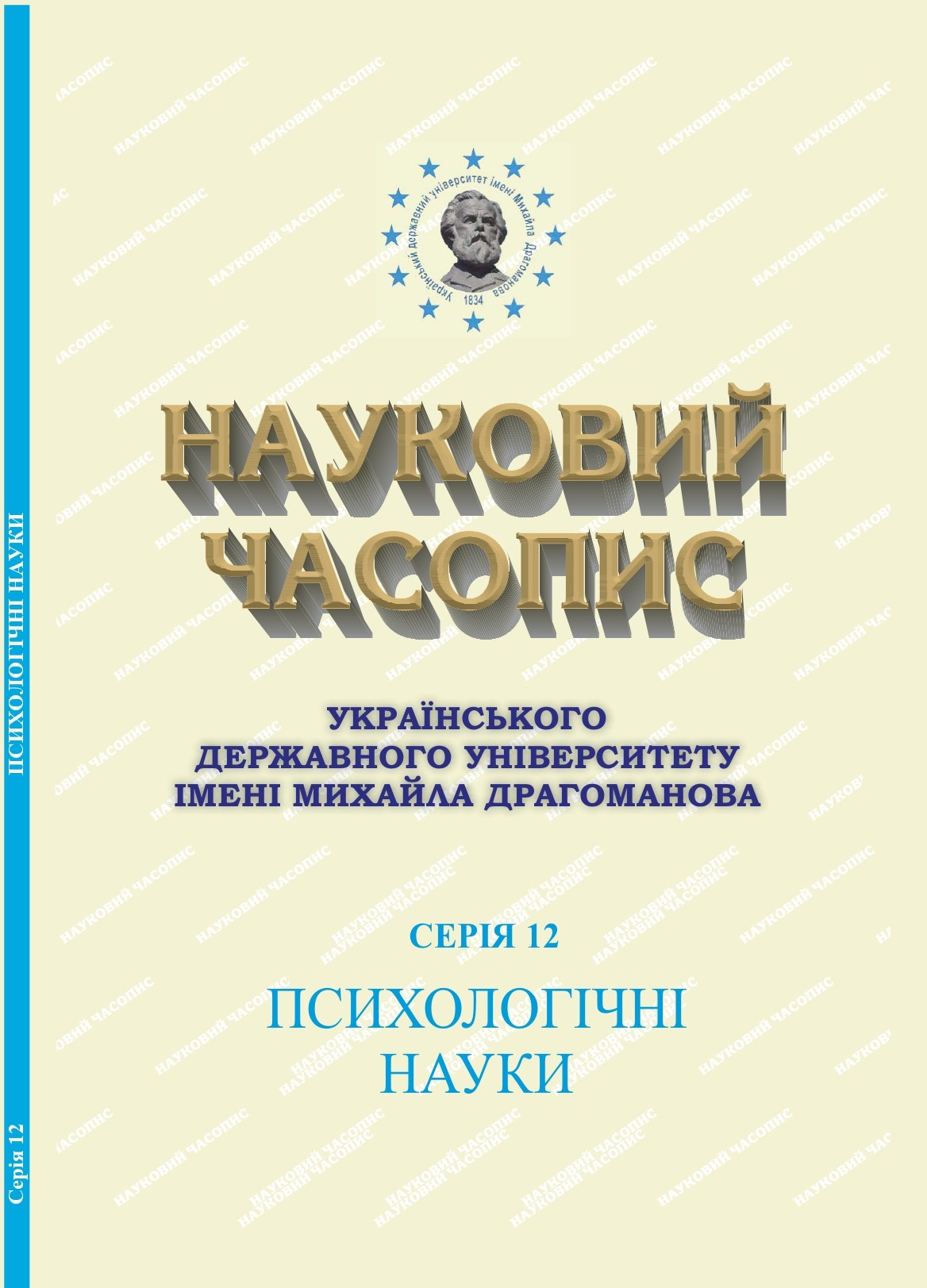INFLUENCE OF ADVERSE CHILDHOOD EXPERIENCES OF PARENTS ON THE FORMATION OF PARENTING STYLE OF CHILDREN WITH ADHD
DOI:
https://doi.org/10.31392/UDU-nc.series12.2023.22(67).05Keywords:
attention deficit hyperactivity disorder, family, parenting styles, adverse experience, childhood.Abstract
The article theoretically and empirically examines the peculiarities of the influence of adverse childhood experiences on parenting style. The main styles of upbringing, their content and peculiarities of manifestation are considered. The concept of psycho-traumatic experience and its influence on the process of child development, the relationship with parenting styles are revealed. An empirical study of the peculiarities of the impact of adverse childhood experiences on the parenting style of children with ADHD was conducted. 42 respondents, middle-aged people of stable social status who were raising children with ADHD, took part in the study. The Adverse Childhood Experiences questionnaire and the Family Education Strategy test were used to conduct the empirical research. According to the results of the analysis of the data obtained, it was found that the main negative childhood experience for the interviewees were humiliating, disdainful attitude, the feeling that children were not loved, physical harm both to the children themselves and to their close family members, the lack of family support, the use of “silent” punishment and presence of roommates with alcohol or drug addiction. It was established that 90.5% of the respondents had negative childhood experiences, and 13% of these respondents had a high level of traumatization. When analyzing qualitative indicators, a number of correlations were found for each of the styles of parenting with the factors of negative childhood experiences. Thus, the liberal parenting style has significant correlations with child neglect (frequent illnesses, hospitalization, living with adults with alcohol and drug addiction), bullying, fear of physical and emotional violence (punishment with silence). At the same time, strong correlations of authoritarian parenting style with such factors of traumatization as fear of physical violence, bullying, living with adults with alcohol and drug addiction, a sense of lack of love from parents were recorded. The prospects for further theoretical and practical research of this issue are to study the impact of negative childhood experiences on the parenting style in families of children with ADHD, to find strategies to overcome this issue in the context of parent-child interaction.
References
- Berehova, N., & Fedorchuk, P. (2020). Vplyv simeinoho vykhovannia ta formuvannia osobystosti dytyny [The influence of family education and the formation of a child's personality]. Visnyk Lvivskoho universytetu. Seriia psykholohichni nauky – Bulletin of Lviv University. Psychological sciences serie, 6, 10–15. Retrieved from http://elar.khmnu.edu.ua/jspui/handle/123456789/9018 [in Ukrainian].
- Vlasova, O.I., Rodina, N.V., Tselikova,Yu.O., Vornikova, L.K., & Tykhonenko, Yu.O. (2022). Modyfikatsiia, standartyzatsiia ta adaptatsiia ankety nehatyvnoho dytiachoho dosvidu (ACE) [Modification, standardization and adaptation of the Negative Childhood Experiences (ACE)]. Oftalmolohichnyi zhurnal- Ophthalmological journal, 1(504), 63–72 [in Ukrainian].
- Mastiukova, E. , & Moskovkina, A. (2003). Simeine vykhovannia ditei z vidkhylenniamy v rozvytku [Family upbringing of children with developmental disabilities]. Retrieved from http://socio.125mb.com/mastyukova-moskovkina-semeynoe-vospitanie-26935.html [in Ukrainian].
- Medina, Dzh. (2016). Pravyla rozvytku mozku dytyny [Rules of child brain development]. Kyiv : Nash Format [in Ukrainian].
- Turynina, O.L. (2017). Psykholohiia travmuiuchykh sytuatsii [Psychology of traumatic situations]. Kyiv : DP Vydavnychyi dim «Personal» [in Ukrainian].
- Miliutina, L. (2018). Model empirychnoho doslidzhennia naslidkiv dytiachoho dosvidu u doroslomu zhytti. Zbirnyk naukovykh prats Zaporizkoho natsionalnoho universytetu ta Instytutu psykholohii imeni H.S. Kostiuka NAPN Ukrainy – Collection of scientific works of the Zaporizhia National University and H.S. Kostyuk Institute of Psychology of the National Academy of Sciences of Ukraine, 2, 43–57. Retrieved from http://www.journalsofznu.zp.ua/index.php/psych/article/view/403 [in Ukrainian].
- Pavlyk, O.B. (2012). Typolohiia styliv vykhovannia. Pedahohichnyi dyskurs - Pedagogical discourse, 12(2), 253–257. Retrieved from http://nbuv.gov.ua/UJRN/0peddysk_2012_12_59 [in Ukrainian].
- Tselikova, Yu.O. (2018) Vplyv nehatyvnoho dytiachoho dosvidu na formuvannia komunikatyvnoi tolerantnosti. Prychornomorskyi naukovo-doslidnyi instytut ekonomiky ta innovatsii. Naukovyi zhurnal z sotsiolohii ta psykholohii – Black Sea Research Institute of Economics and Innovation. Scientific Journal of Sociology and Psychology,, 18, 2, 125–129. Retrieved from http://habitus.od.ua/journals/2022/43-2022/43_2022.pdf [in Ukrainian].
- Tselikova, Yu.O. (2019). Stupin proiavu ta vydy nehatyvnoho dytiachoho dosvidu sered dorosloho naselennia Ukrainy. Zbirnyk naukovykh prats Zaporizkoho natsionalnoho universytetu ta Instytutu psykholohii imeni H.S. Kostiuka NAPN Ukrainy - Collection of scientific works of the Zaporizhia National University and H.S. Kostyuk Institute of Psychology of the National Academy of Sciences of Ukraine,, 1(156), 141–146. Retrieved from http://nbuv.gov.ua/UJRN/pspz_2019_1_23 [in Ukrainian].
- Perri, B., & Salavits, M. (2021). Khlopchyk, yakoho vykhovuvaly yak sobaku [A boy who was raised as a dog]. Kyiv : Vydavnytstvo «Fors» [in Ukrainian].
- Bell, C.C. (1994). Diagnostic Criteria From DSM-IV,by the American Psychiatric Association. Washington, DC : American Psychiatric Press Inc,
- Deater-Deckard, K. (2004). Parenting stress and child adjustment: Some old hypotheses and new questions. Clinical Psychology: Science and Practice, 5, 314–332.
- Evans,, & Rothbart, M.R. (2007). Developing a model of adult temperament. Journal of Research in Personality, 41, 868–888.
- Kadesjö, C., Stenlund , H., Wels, P., Gillberg, C., & Hägglöf, B. (2002). Appraisals of stress in child-rearing in Swedish mothers pre-schoolers with ADHD: A questionnaire study. European Child & Adolescent Psychiatry, 11, 185–195.
- Wang, X., Heath, R.D., Majewski, D., & Blake, C. (2020). Adverse childhood experiences and child behavioral health trajectory from early childhood to adolescence: A latent class analysis. Child Abuse & Neglect, 134, 37–45.
- World Health Organization (WHO). (2014). Child maltreatment [Internet]. (Сited 2020 Jun 10). Retrieved from who.int/news-room/fact-sheets/detail/child-maltreatment»,
www.who.int/newsroom/factsheets/detail/child-maltreatmentwww.who.int/newsroom/
factsheets/detail/child-maltreatment

